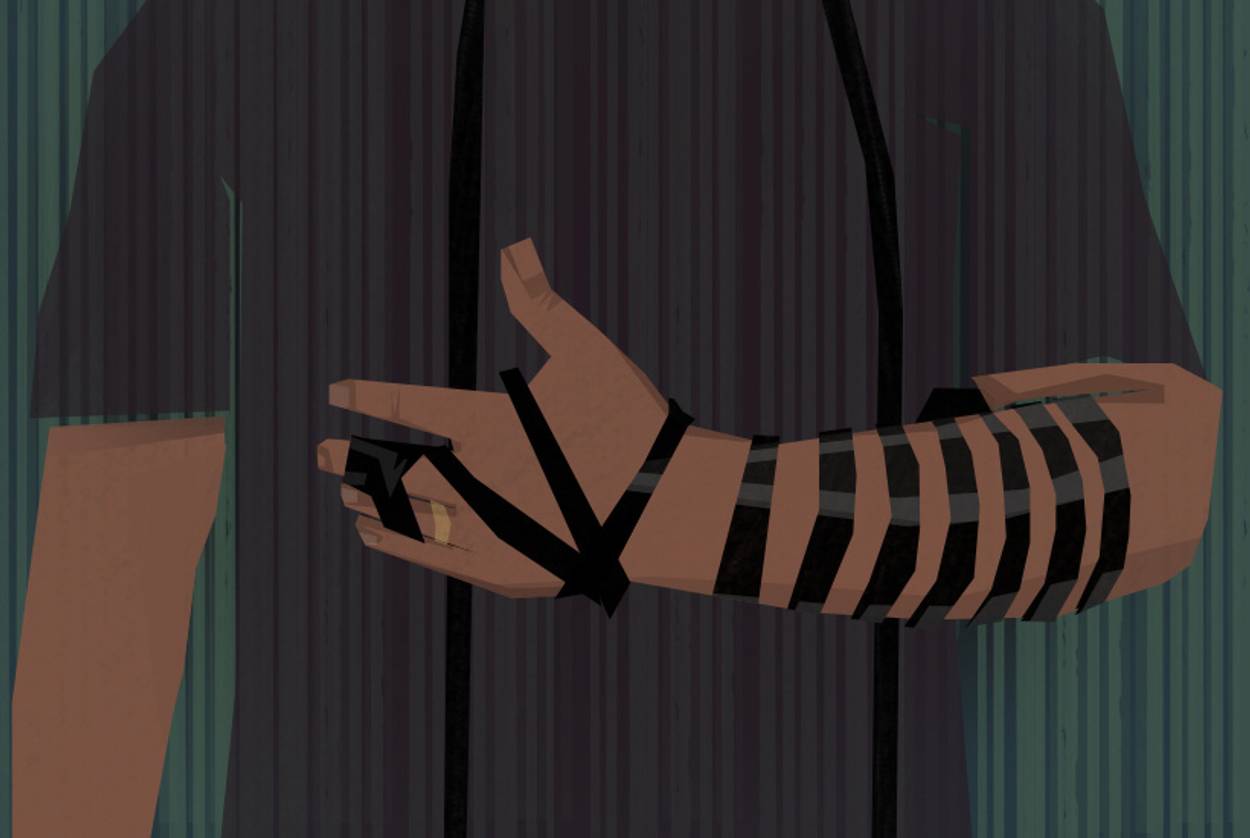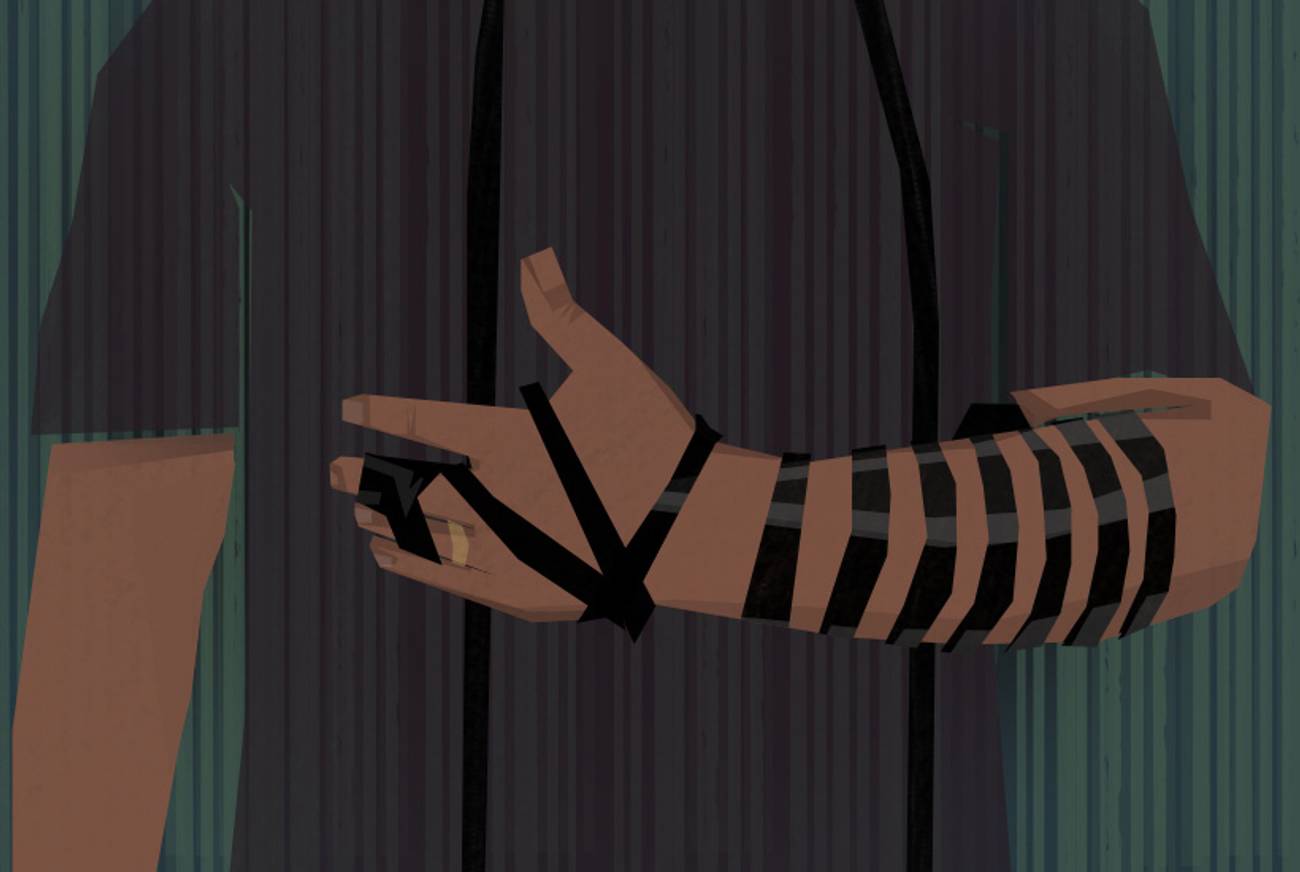A Father’s Prayer for His Newborn Daughter—and for Himself
When our baby had heart surgery, my wife asked me to put on tefillin. I did, for the first time in years, but not the last.




The first attempt to widen our newborn daughter Yael’s too-narrow aorta didn’t take. Something about scar tissue and the elasticity of the arterial walls. The surgeon, who was highly pedigreed and possibly German, assured us with a nonchalance bordering on arrogance that a second operation should work.
On the morning before the surgery, my wife asked me to pray, despite the fact that I don’t actually believe in God. My wife, however, is Israeli; she was not easily deterred. “Put on some tefillin,” she said, “and pray for your daughter.”
The last time I had wrapped myself in holy leather was during a family trip to Israel when I was 14, when I stood atop Masada contemplating the fate of our martyred ancestors, confusing dehydration and jetlag for religious revelation. I returned to my assimilated Jewish existence in Short Hills, New Jersey—home of Brenda Patimkin and the Short Hills Mall—wearing an IDF bullet around my neck and reciting the Sh’ma every night (mostly for my older sister, whose affinity for Nine Inch Nails and marijuana had us all worried). I continued praying until college, when I read From Beirut to Jerusalem and The Doors of Perception and began smoking weed myself.
But now I was 36 years old, with a semi-observant wife, a 2-year-old son, and twin newborn daughters—one of whom needed surgical intervention. While Jacob, the 2-year-old, was transforming our freshly painted kitchen wall into a yogurt-splattered Jackson Pollock, and Yael’s identical twin Maya was achieving a higher state of consciousness in her baby swing, I shuttered myself in my bedroom and tried to focus.
I unsheathed the tefillin boxes from their plastic casings. They were about the size of a child’s fist and blacker than a Hasid’s suit. I never planned on purchasing a set of tefillin. The fact that you had to pay upwards of $500 for a religious artifact struck me as sacrilege—and slightly Dianetic—but I’d changed my mind several months earlier. I had just quit my high-paying job in Big Law only to learn that my wife was expecting twins. Our increase in children was forcing us out of our Brooklyn one-bedroom to Riverdale, a Bronx neighborhood where post-war three-bedrooms were outnumbered only by convalescent centers. And, on top of all that, we discovered on a routine ultrasound that one of the twins would need open heart surgery soon after birth. “It looks like your daughter has a hole in her heart,” the doctor said, before she clarified: “One of your daughters.” Then one evening the rabbi from Brooklyn Heights Chabad called me with an offer: a “nice” set of tefillin for half off. I was sure that he had negotiated some kind of kickback over morning minyan, but I was in desperate need of a spiritual infusion. I accepted his offer.
Taking the discount tefillin out now for the first time, I scrutinized the black boxes, wondering what was inside. Surely something so terrifying that it must be covered, encrypted, out of view: resolution of the Heisenberg uncertainty principle or a list of the Mossad’s Most Wanted. The Kabbalists say that simmering inside the square crypts is the Jewish Soul wrestling with itself: Does God exist after the Holocaust? Why did God ask Abraham to sacrifice Isaac? Should Sandy Koufax have pitched on Yom Kippur? For true believers, the boxes are hot to the touch.
For me, not so much.
While he was plying me with whiskey shots on Simchat Torah, the Chabad rabbi had told me that you can ask for anything when wearing tefillin and God will hear. Maybe, I thought, wrapping the straps tightly around my arm and head would cut off the blood flow to my brain, thus allowing me, if only for a moment, to believe that God exists. As I wrapped the leather around my arm, I remembered the words of the mystics and my mother-in-law: We will do and then we shall hear.
It’d been a long time since I was 14, and I had forgotten exactly how to put on tefillin. I relied on the “Tefillin Wizard” from Chabad.org for step-by-step instructions. Unlike the yarmulke—that sleek, minimalist badge of modern Jewry that doesn’t require assembly instructions—tefillin is clunky and archaic. Shtetl Judaism. Its awkward design feels like it was hastily assembled while fleeing Pharaoh and never updated since. Which is to say that wearing tefillin is something you do privately, first thing in the morning.
I was instructed to recite the V’ahavta, which I vaguely remembered from Hebrew school. You must love the Lord your God with all your heart, with all your soul, and with all your might. Half-measures would not be tolerated. I placed the black box on my head and closed my eyes. Outside, Jacob experimented with abstract expressionism on our hardwood floors while Maya reeked of a massive bowel movement. The black box put just enough pressure on my head for me to know it was there.
I was suddenly struck by the memory of sitting next to my father in synagogue during the waning hours of Yom Kippur when I was 10 years old, refusing to stand during the Aleinu. My father had pinched the back of my neck the way only fathers can—firm, measured, unequivocal—and lifted me up.
The straps wound tightly along my left arm dug into my skin with a satisfying burn. I recited the transliterated prayer and waited. I experienced no blinding insight, no revelatory visions, no glowing orbs. And then, for a brief moment, I could swear the boxes start to feel a little warm.
***
“At least we’ll be able to tell them apart,” I said to my wife when we first learned that Yael would need open-heart surgery—a blithe reference to the inevitable scar that would trail her chest like a dry riverbed. My wife did not laugh.
We alternated days between the hospital and home while Yael was tethered to a heart monitor waiting for a spot to clear on the surgeon’s schedule. My nights in the pediatric ICU were a welcome reprieve from my futile attempts to juggle my irreconcilable roles as a diaper-changer, distracted husband, and billable-hour churner. The only decisions to be made were trivial (where to order dinner); the nurses took care of the rest. At night I watched movies on Netflix while Yael slept in the hospital crib next to me. I turned the volume down low so I could hear her if she woke up.
Although the second surgery worked, Yael’s vocal cord was partially paralyzed during the process—a somewhat common side effect that was purportedly disclosed during the blizzard of pre-surgery consultations and waiver-signings. Vocal cords are important for basic human functions like eating and breathing, and for several months after the surgery Yael couldn’t take more than a couple gulps of formula without crying, and she sucked in her chest when she breathed. The doctors said everything was fine, which didn’t prevent us from whisking her to the emergency room on more than one occasion when she breathed like an emphysema victim in need of an oxygen tank.
*
Maya and Yael recently celebrated their first birthday. Most of the time, I can distinguish my daughters without reference to the scar (Maya has a higher hairline and is fatter). But between the hallucinatory hours of 1 a.m. and 6 a.m. when the perpetual loop of wailing, wiping, feeding, and burping makes me glad I watched the Shaken Baby Syndrome video before leaving the hospital, I have no idea who is who. You can’t see the scar at night unless you turn the light on.
Yael’s heart is strong and her breathing has improved. She is smaller than her sister and more independent, although she cries uncontrollably whenever she sees my father. She was the first to stand up. In short, she is doing fine. I, on the other hand, am not.
I have not lain tefillin since that morning before Yael’s surgery. As her condition improved, mine deteriorated. My worry and fear found new attachments. It started with the hospital bills, which rose faster than the Flood. Between the bills, the nanny, and the stockpiles of formula, my wife and I were strapped. At work I was unfocused and distracted—putting on matching socks was a minor victory. Stuck in Riverdale without a car, our weekends consisted of trips to the CVS, supermarket, and Starbucks—our lives reduced to coffee and coupons.
One recent Friday night I came home to find my wife lighting Shabbat candles for the first time since the girls were born. Jacob reached for the flames, which he called a menorah. He stared at my wife in silence when she recited the bruchah. Later that night, when all the kids were sleeping, my wife said that she was going to try and light Shabbat candles every week. I said that this sounded like a good idea. Gently, she suggested that I try to lay tefillin, if only once or twice a week. “I think we really need it,” she said. I actually agreed. This time, it had nothing to do with Yael’s heart and everything to do with mine.
***
Like this article? Sign up for our Daily Digest to get Tablet Magazine’s new content in your inbox each morning.
Jonathan Sabin lives in Riverdale and works as an attorney when he is not changing diapers. He is futilely training for the New York City marathon by running with his kids in a jogging stroller.
Jonathan Sabin lives in Riverdale and works as an attorney when he is not changing diapers. He is futilely training for the New York City marathon by running with his kids in a jogging stroller.